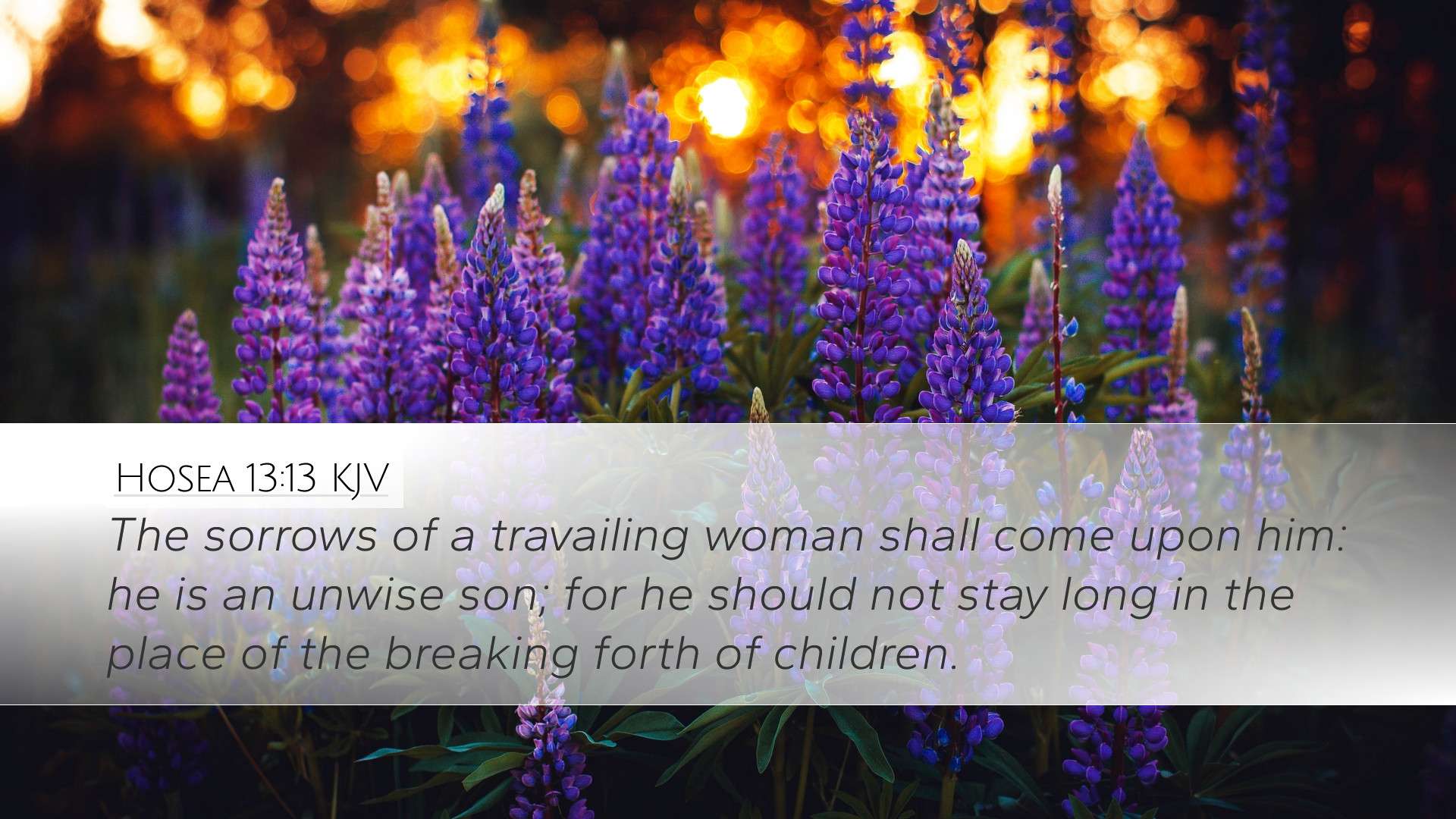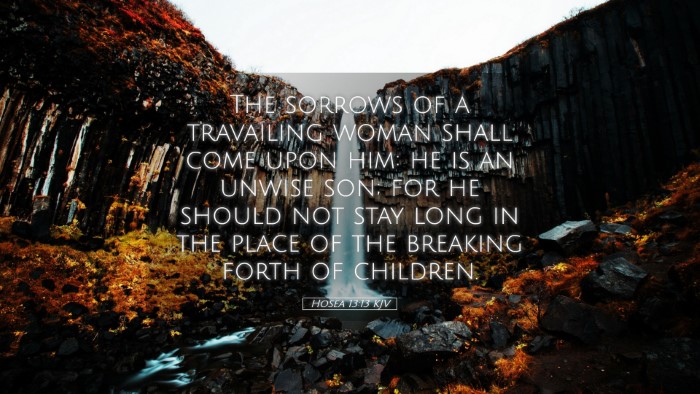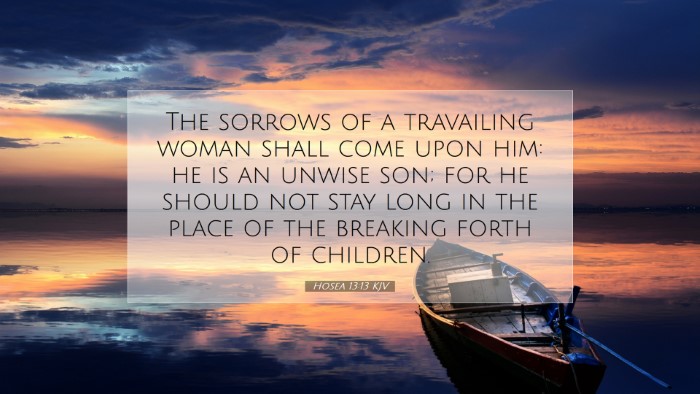Old Testament
Genesis Exodus Leviticus Numbers Deuteronomy Joshua Judges Ruth 1 Samuel 2 Samuel 1 Kings 2 Kings 1 Chronicles 2 Chronicles Ezra Nehemiah Esther Job Psalms Proverbs Ecclesiastes Song of Solomon Isaiah Jeremiah Lamentations Ezekiel Daniel Hosea Joel Amos Obadiah Jonah Micah Nahum Habakkuk Zephaniah Haggai Zechariah MalachiHosea 13:13
Hosea 13:13 KJV
The sorrows of a travailing woman shall come upon him: he is an unwise son; for he should not stay long in the place of the breaking forth of children.
Hosea 13:13 Bible Commentary
Commentary on Hosea 13:13
Text of Hosea 13:13 (ESV): "The pains of childbirth come for him, but he is an unwise son; for at the right time he does not present himself."
Introduction
The book of Hosea emerges as a poignant narrative that intertwines the themes of sin, punishment, mercy, and restoration. In Hosea 13:13, the prophet utilizes vivid imagery to convey God’s message regarding the impending judgment on Israel, depicted through the metaphor of childbirth. This verse acts as a critical point in Hosea's message, encapsulating the spiritual condition of Israel and God's response.
Contextual Analysis
This verse comes at a pivotal moment in the prophecy when Israel is warned about the repercussions of idolatry and unfaithfulness. The chapter depicts Israel’s rebellion against God, emphasizing the tragic consequences of their choices. The metaphor of childbirth illustrates both the anticipated pain and the failure of Israel to respond wisely to God's call. Each commentary provides further insight into understanding the implications of this verse:
Insights from Matthew Henry
Matthew Henry emphasizes the national discourse, describing Israel as an unwise son who fails to heed the warnings associated with divine judgment. He states that the pains of childbirth symbolize the impending tribulations that Israel would face due to their disobedience. Just as a mother experiences labor pains before the birth of a child, Israel faces the turmoil that leads to national collapse. Henry suggests the importance of recognizing these divine signals, where the pain serves not only as punishment but as a precursor to potential restoration.
Insights from Albert Barnes
Albert Barnes provides a detailed explanatory approach to the phrase “unwise son.” He identifies the foolishness inherent in turning away from God amid adversity. The metaphorical childbirth pains suggest an unavoidable consequence, hinting at both impending judgment and the possibility of regeneration. Barnes underscores that Israel's failure to recognize the “right time” for repentance leads to an exacerbation of their suffering. He posits that wisdom lies in acknowledging one’s faults and returning to God, which could have altered their fate.
Insights from Adam Clarke
Adam Clarke elucidates the prophetic nature of Hosea’s statement, viewing the childbirth metaphor as a strong indicator of the distress that precedes judgment. Clarke connects Israel's disobedience with their lack of understanding regarding appropriate responses to divine interventions. He further explicates that the phrase “does not present himself” signifies Israel's neglect to approach God with humility and repentance. Clarke’s analysis invites readers to consider the spiritual implications of remaining distant from God during times of crisis.
Theological Reflections
In reflecting on Hosea 13:13, it becomes evident that the verse serves as both a warning and a call to action. The theology underlying the text presents critical insights into God’s expectations from His people:
- The Nature of God’s Law: The verse is a reminder of God's unchanging standards and expectations, necessitating immediate acknowledgment of one's failures.
- The Role of Pain in Spiritual Growth: Just as childbirth is painful yet ultimately fruitful, the pains of spiritual discipline and judgment can lead to growth and restoration.
- The Consequences of Ignorance: The depiction of the “unwise son” warns against the dangers of ignoring God's call and remaining obstinate amid trials.
Lessons for Today
The nuances of Hosea 13:13 carry profound implications for contemporary believers:
- The Call to Repentance: Just as Israel was urged to respond wisely to their dire situation, modern believers are also called to examine their lives and return to God when straying from His path.
- Recognizing Divine Signals: Believers must remain vigilant to the signals of distress in their lives, recognizing them as opportunities to seek reconciliation with God.
- The Promise of Restoration: Just as the childbirth metaphor carries hope, so too does the promise of God’s mercy upon those who return to Him in humility.
Conclusion
Hosea 13:13 serves as a profound reminder of the interplay between sin and the resulting suffering that follows disobedience. The commentaries of Matthew Henry, Albert Barnes, and Adam Clarke collectively elucidate the weight of the verse, emphasizing the need for repentance and the importance of heeding God’s voice. As we reflect on this passage, both scholars and laypersons alike are challenged to cultivate wisdom, recognize God’s gentle nudge towards restoration, and ultimately foster a deeper relationship with the Creator.


